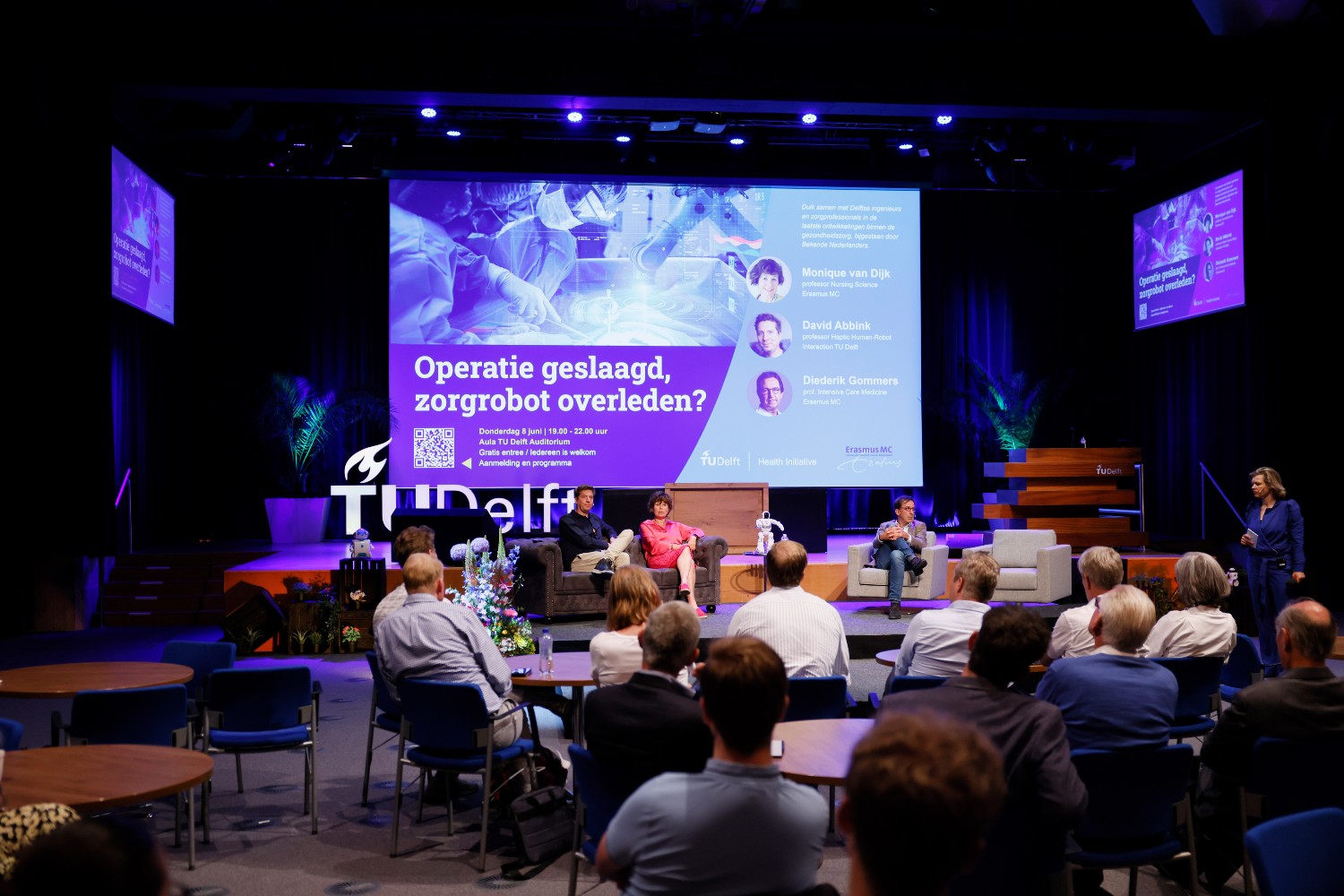The role of robots in healthcare is clear: to make nurses’ work more attractive. The question is how. Gommers: “Surely we can say we don’t know!”
David Abbink, Monique van Dijk and Diederik Gommers discussed the role of robots in heathcare. (Photo: Roy Borghouts)
It was finally possible to hold a public evening on technology in healthcare again. The Delft Health Initiative usually holds these meetings twice a year, but Covid-19 interrupted the series. On Thursday, 8 June 2023, the ‘Health College’ in the Aula was about robots in healthcare. The speakers were Diederik Gommers (OR Department Head at Erasmus MC), Monique van Dijk (Professor of Healthcare Science at Erasmus MC), and David Abbink (Professor in Haptic Human-Robot Interaction at TU Delft).
The shortage of healthcare staff is in the news almost daily. Can robots reduce the workload and make the work of care staff more attractive, asked science journalist Desiree Hoving who presented the evening.
New heart valve
Diederik Gommers outlined a healthcare trap. Currently, one in seven workers works in healthcare. With an ageing population, the need for healthcare workers will rise to one in four workers, Gommers said. But that many care workers are not available, leaving aside the question of economic feasibility. The Netherlands must therefore take unconventional measures to reduce the demand for care, Gommers suggested.Strongly promoting a healthy lifestyle can help, as can moving care to the home with remote monitoring. But questions about the usefulness of certain interventions should also no longer go unanswered. “A new heart valve for an 85-year-old. Does that make sense?”
‘Pot peeker’
“Robots could help nurses make more time for nursing,” argued Monique van Dijk, who started her career as a nurse at Erasmus MC. So what stands in the way of practising nursing? Looking for things is at the top of the list. Where is the toilet seat, the bladder scan, or the medication? In second place is administration. Why can’t a sophisticated Dictaphone store blood values and other data directly in a patient’s data file?
If you ask the nurses and caregivers themselves, they often come up with practical suggestions: a device to read the fluid level from a container on the floor (the ‘pot peeker’) or a plastic bracket on the edge of the bed that keeps all the tubes and cables together (the Koos guard). At Rotterdam’s Create4Care centre, technicians and nurses together develop solutions for everyday convenience. These do not usually have to be high-tech.
Shop floor
What can a high-tech device like a robot add to that? With that very question, David Abbink and his diverse team spent three months on hospital wards at Erasmus MC. Nurses had to get used to being observed by engineers, designers, organisational experts, and healthcare scientists. But by shadowing them and having conversations, care workers, engineers and business experts learned to understand each other better.
Robots are rigid, strong and tireless, nurses smart and flexible
Successful robots in healthcare include the Da Vinci surgical robot (basically a highly sophisticated remote control) and the pharmacy robot that prepares medication for hundreds of patients. And this is no accident.
“Robots are more precise, faster and stronger than humans,” Abbink says, “but only in a very structured fixed environment.” Improvisation is out of the question. That is precisely what nurses are known for with their ‘workarounds’. Tirelessly, they come up with a workaround for every problem that pops up. Robots are rigid, strong and tireless, nurses smart and flexible. It sounds like an ideal couple. But after three months, Abbink still cannot tell how robots can make nursing easier or more interesting. The observations of the past few months are still being worked out. However, Abbink did see that all the attention paid to their profession made nurses happy and proud.
Audience
At the end of the evening, someone in the audience drew the conclusion that “Robots are never going to solve the shortage in healthcare like this.” Gommers unexpectedly seconded him. “There simply is no solution. Surely, we are allowed to say we don’t know!”
- The next episodes of Health College will take place in September and February, according to Delft Health Initiative President Richard Goossens. They will then be about mental health. The first episode took place in July 2018 and was presented by astronaut and physician André Kuipers.
Do you have a question or comment about this article?
j.w.wassink@tudelft.nl


Comments are closed.